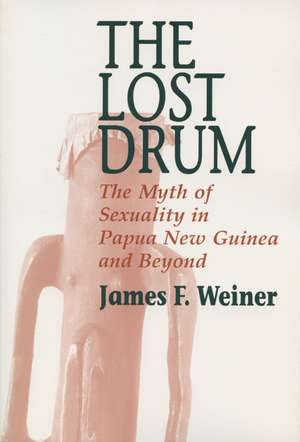Lost Drum: The Myth of Sexuality in Papua New Guinea and Beyond: New Directions in Anthropological Writing
Autor James F. Weineren Limba Engleză Hardback – 14 dec 1995
The Lost Drum is both a theoretical experiment in anthropology and a provocative analysis of myth and ritual in Papua New Guinea societies. James F. Weiner offers the first comprehensive attempt to fashion an anthropological method from the psychoanalytic theories of Jacques Lacan and extends his own previous work on Melanesian sociality and language.
Applying literary, psychoanalytic, and hermeneutic theories to myths of the Foi, Marind-anim, Yafar, and Gimi peoples, Weiner shows how mythic narratives reveal the productive and consumptive processes that compose the New Guinea person and body. He uncovers a discourse on sexuality, consumption, voice, and subjectivity that both challenges the neo-Freudian paradigm that has dominated psychological anthropology and disputes the reciprocity and exchange models of social integration that have characterized descriptions of Melanesian society.
Expanding upon Roy Wagner's theory of symbolic obviation, Weiner argues against constructionist readings of text: "myth does not represent social reality but only models a specific way of making it visible." In The Lost Drum, he traces the route of certain objects—the string bag, the drum, the bullroarer, the flute-as their meanings unfold in the mythical narratives of Papua New Guinea. In so doing, he illuminates the instability of social and sexual identities in Melanesia.
Applying literary, psychoanalytic, and hermeneutic theories to myths of the Foi, Marind-anim, Yafar, and Gimi peoples, Weiner shows how mythic narratives reveal the productive and consumptive processes that compose the New Guinea person and body. He uncovers a discourse on sexuality, consumption, voice, and subjectivity that both challenges the neo-Freudian paradigm that has dominated psychological anthropology and disputes the reciprocity and exchange models of social integration that have characterized descriptions of Melanesian society.
Expanding upon Roy Wagner's theory of symbolic obviation, Weiner argues against constructionist readings of text: "myth does not represent social reality but only models a specific way of making it visible." In The Lost Drum, he traces the route of certain objects—the string bag, the drum, the bullroarer, the flute-as their meanings unfold in the mythical narratives of Papua New Guinea. In so doing, he illuminates the instability of social and sexual identities in Melanesia.
Preț: 345.10 lei
Preț vechi: 434.12 lei
-21% Nou
Puncte Express: 518
Preț estimativ în valută:
66.04€ • 71.71$ • 55.48£
66.04€ • 71.71$ • 55.48£
Carte indisponibilă temporar
Doresc să fiu notificat când acest titlu va fi disponibil:
Se trimite...
Preluare comenzi: 021 569.72.76
Specificații
ISBN-13: 9780299148607
ISBN-10: 0299148602
Pagini: 192
Dimensiuni: 152 x 229 x 18 mm
Greutate: 0.51 kg
Ediția:New.
Editura: University of Wisconsin Press
Colecția University of Wisconsin Press
Seria New Directions in Anthropological Writing
ISBN-10: 0299148602
Pagini: 192
Dimensiuni: 152 x 229 x 18 mm
Greutate: 0.51 kg
Ediția:New.
Editura: University of Wisconsin Press
Colecția University of Wisconsin Press
Seria New Directions in Anthropological Writing
Notă biografică
James F. Weiner is professor of anthropology at the University of Adelaide. He is the editor of Mountain Papuans and the author of The Empty Place: Poetry, Space, and Being among the Foi of Papua New Guinea and The Heart of the Pearl Shell: The Mythological Dimension of Foi Sociality.
Descriere
The Lost Drum is both a theoretical experiment in anthropology and a provocative analysis of myth and ritual in Papua New Guinea societies. James F. Weiner offers the first comprehensive attempt to fashion an anthropological method from the psychoanalytic theories of Jacques Lacan and extends his own previous work on Melanesian sociality and language.
Applying literary, psychoanalytic, and hermeneutic theories to myths of the Foi, Marind-anim, Yafar, and Gimi peoples, Weiner shows how mythic narratives reveal the productive and consumptive processes that compose the New Guinea person and body. He uncovers a discourse on sexuality, consumption, voice, and subjectivity that both challenges the neo-Freudian paradigm that has dominated psychological anthropology and disputes the reciprocity and exchange models of social integration that have characterized descriptions of Melanesian society.
Expanding upon Roy Wagner's theory of symbolic obviation, Weiner argues against constructionist readings of text: "myth does not represent social reality but only models a specific way of making it visible." In The Lost Drum, he traces the route of certain objects—the string bag, the drum, the bullroarer, the flute-as their meanings unfold in the mythical narratives of Papua New Guinea. In so doing, he illuminates the instability of social and sexual identities in Melanesia.
Applying literary, psychoanalytic, and hermeneutic theories to myths of the Foi, Marind-anim, Yafar, and Gimi peoples, Weiner shows how mythic narratives reveal the productive and consumptive processes that compose the New Guinea person and body. He uncovers a discourse on sexuality, consumption, voice, and subjectivity that both challenges the neo-Freudian paradigm that has dominated psychological anthropology and disputes the reciprocity and exchange models of social integration that have characterized descriptions of Melanesian society.
Expanding upon Roy Wagner's theory of symbolic obviation, Weiner argues against constructionist readings of text: "myth does not represent social reality but only models a specific way of making it visible." In The Lost Drum, he traces the route of certain objects—the string bag, the drum, the bullroarer, the flute-as their meanings unfold in the mythical narratives of Papua New Guinea. In so doing, he illuminates the instability of social and sexual identities in Melanesia.








